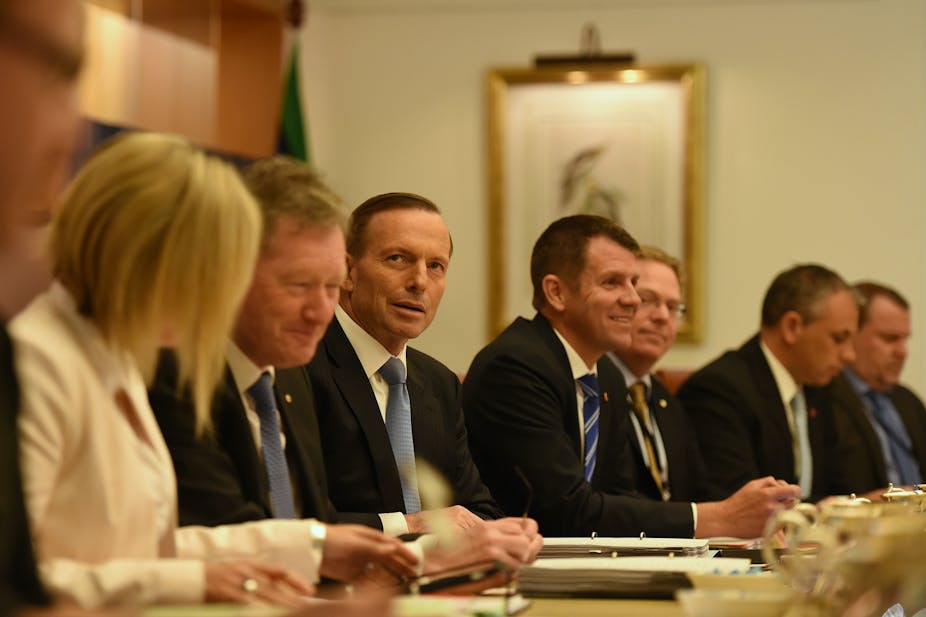In the past few weeks, we’ve seen the Abbott government announce a A$30 million national awareness campaign on domestic violence, Opposition Leader Bill Shorten call for a national summit and a Queensland taskforce finish its report while Victoria’s Royal Commission gets underway.
But, for decades, people have been making the same recommendations in the many past reviews and action plans. Instead of acting on those recommendations properly, successive governments have cherry-picked the easy fixes and ignored the hard stuff.
So no more debating the problem at summits, royal commissions or revised action plans. It’s time to act.
Deja vu
Whether it’s in Australia or overseas, if you read enough reviews and reports on domestic violence, certain recommendations keep cropping up.
Take the Queensland Special Taskforce on Domestic and Family Violence, led by Dame Quentin Bryce, which handed its 368-page report to the Queensland government on February 28.
Its 140 recommendations include:
- changing community attitudes through education, prevention and communication initiatives targeting school students, employers, lawyers, doctors and teachers
- developing more integrated service responses to better help victims and overcome current barriers to information-sharing
- increasing the availability and standard of perpetrator intervention programs
- improving court orders and processes so that they have more specialist knowledge, share information and are more victim-focused
- developing an ongoing strategy and framework for implementing, resourcing and evaluating these initiatives.
These are all sound proposals. Yet, there is little that we haven’t heard before.
Flick back through the 2009 joint report of the Australian and NSW Law Reform Commissions, the 2012 NSW Standing Committee on Social Issues report, the 2010 National Action Plan to reduce violence against women and children, and the follow-up Second Action Plan launched by the prime minister last year.
All of those build on three decades of reviews, reports and task forces. And in each of those reports, there are familiar recommendations, such as better integrated victim services, more effective victim-centred legal responses, raising community awareness, and greater focus on intervention and prevention.
All recognise that this is a deeply entrenched social problem, which requires long-term, multi-pronged solutions, not quick fixes.
Similar lessons from overseas
Of course, Australia isn’t alone.
Domestic violence is a global problem, found even in countries often seen as having greater gender equality, lower levels of violence and less punitive criminal justice systems. In Sweden, a 2011-2012 European Union survey of women reported more than one in four reported physical or sexual violence by a current or previous partner.
Both the Swedish and Norwegian governments have recognised domestic violence as a significant issue. Again, if you look at what their expert reports call for, we see familiar arguments for a comprehensive approach, increased coordination of victim services, treatment and intervention, and effective investigation and prosecution.
A little closer to our legal system, the UK government’s 2013 Call to End Violence against Women and Children action plan sets out the same kinds of strategies we’ve seen called for in Australia.
The four missing ingredients Australia needs
So if everyone broadly agrees on the recipe for change, what are the four missing ingredients in our approaches, which Australia has never tried before and which we can’t succeed without?
First, from our governments we need long-term bipartisan leadership and commitment to implementation and evaluation at a national and state and territory government level. Planning in terms of three-year or four-year electoral cycles just doesn’t cut it.
Don’t just make a promise for this term of office. Sit down with your state and federal oppositions and come up with a bipartisan plan, with locked-in, long-term funding and commitments, and coordinate this nationally.
Second, we need sustained community pressure for long-term leadership and change. As a community, we should not be satisfied with short-term solutions.
Third, we all need to show a willingness to change our culture, not just our laws. Although more effective responses for victims are essential, these do not stop the problem. We need to change deeply embedded attitudes. Education and communication programs are an important part of this, but one-off campaigns – like the new A$30 million campaign that has just been announced – are not enough.
The evidence shows that such campaigns are only effective when reinforced by other direct measures aimed at helping victims, treating offenders and improving services. The planned cuts to legal and support services run completely counter to this objective.
Fourth, we need comprehensive responses that tie all these things together. We can’t afford to let governments keep cherry-picking only the headline-grabbing proposals; this is a complicated problem, requiring complex, integrated solutions.
A chance to finally get it right
If there’s one positive sign of change in Australia today, it’s that there seems to be more bipartisan political support for greater action on domestic violence than there ever has been before.
The new interest in domestic violence from the prime minister and various premiers down is welcome, and having Rosie Batty as Australian of the Year gives Australia a real chance of getting people talking and acting on this in a way that we haven’t before.
Prime Minister Tony Abbott wants to place domestic violence at the centre of the agenda for a Council of Australian Governments (COAG) meeting in the middle of the year.
Will the 10 political leaders sitting around the COAG table that day – the prime minister, flanked by our state, territory and local government leaders – seize that chance to finally act on this deadly national scourge? Or will that meeting be just more talk?
We, as a community, cannot let this chance to achieve lasting change slip.
Anyone at risk of family and domestic violence and/or sexual assault can seek help 24 hours a day, seven days a week, either online or by calling 1800 RESPECT (1800 737 732). Information is also available in 28 languages other than English.
Read other articles in The Conversation’s ongoing domestic violence coverage.

